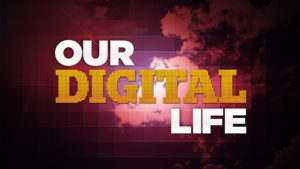The Internet is a powerful tool with both positive and negative implications. Our digital lives don’t need to make us unhappy, unhealthy, and unwise. Students discuss their online lives and responsible digital citizenship.
.W
Watch
Glossary
- to be open to options – to wait before making a final decision about something to allow for the possibility of having a different choice
- dumb – stupid, foolish
- to give smb credit for sth – to acknowledge an accomplishment
- digital footprint – the information about a particular person that exists on the Internet as a result of their online activity
- sort of/kind of – in some way or to some degree
- messy – confused and difficult to deal with, unpleasant, problematic
- to broadcast sth – to spread information to a lot of people
- mashup – something created by combining elements from two or more sources: such as a piece of music created by digitally overlaying an instrumental track with a vocal track from a different recording; a movie or video having characters or situations from other sources; a Web service or application that integrates data and functionalities from various online sources
Watch and listen
Answer the questions below.
- How much do kids share online? (1:00)
- Do kids present themselves differently online than they do in reality? (1:35)
- How do kids treat others online? (2:05)
- How is others’ work treated online? (2:45)
Practice Makes Perfect
Fill in the blanks with the correct form of the verb (gerund or infinitive) in brackets. Go to Harvard Business Review to find out more.
American adults now spend over 11 hours per day 1a.________ (listen) to, b.________(watch), c.________(read) or generally d.________(interact) with media—sometimes longer. That’s more time than we spend e.________(eat) and f.________(sleep).
[…]
More work is required 2.________(understand) the complex relationship between media diets and depression–mood disorders are not a new phenomenon, even if suicide rates appear 3.________(increasing).
[…]
What else can be done? There is a broad consensus from decision makers in the tech sector, leaders in entertainment, policymakers, and academics that it’s time for a transparent labeling system. Although the conversation is still in its earliest stages, there is optimism around the initiative to start 4.________(categorize) various types of digital material.
[…]
We firmly believe that people deserve 5.________ (know) the possible effects of the content they consume, not just their theme, temperature, or portion size. If we desire and endeavor 6.________ (achieve) better behavioral health outcomes, people everywhere need a greater degree of transparency. And there’s plenty of reason to believe in the promise of proper labeling, based on prior success in similar categories—from food labeling to TV ratings.
Throughout the past half century, a collision of private sector demand (or sensitivity) and public sector interest have encouraged the adoption of labeling systems across many categories of enterprise and consumption. Ratings, standards, and labels, tend 7.________ (emerge) only slowly at first, but quickly spread to the point of ubiquity. We know that people often do not want what’s best for themselves. And so far, tech companies have proven disappointingly unwilling to do what’s best for people. But government intervention should only ever prove the last resort for issues richly and urgently warranting resolution by, and for, the private sector.
[…]
We all deserve 8.________(lead) healthier, happier lives—and need a class of content that accelerates our path toward that future.
Answers:
1.a-f ALL -ing 2. to understand 3.to be increasing 4. categorizing 5. to know 6. to achieve 7. to emerge 8. to lead
.
EXPLORE IT MORE
(582)





